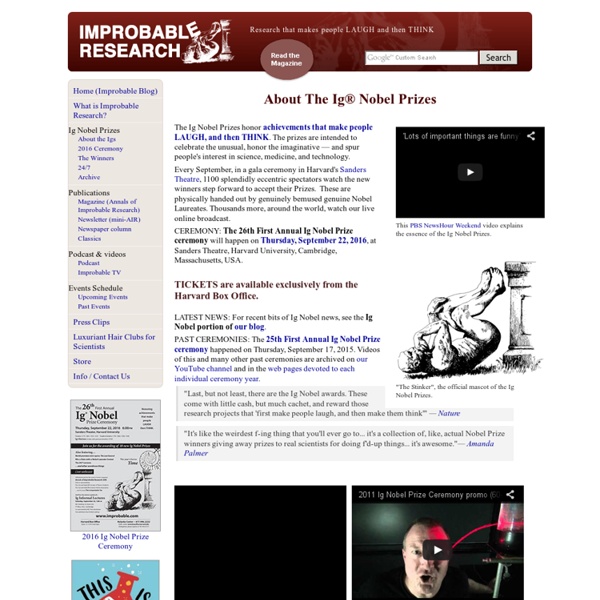



The Royal Institution Create a wine glass orchestra in your kitchen and explore how sound is caused by vibrations. For more ideas, and to download an info sheet click here: Marieke and Tilly experiment with making music and doing science experiments at home. Using wine glasses filled with different volumes of liquids, they investigate how sounds are caused by vibrations and how changing the volume of liquid affects the pitch of the note. Simply rubbing your fingers around the rim of a glass can make an amazing noise. Hybrid cars , on the subject of We’ve seen them around. We know they’re some kind of (some might say) unholy mix between standard internal combustion engines and electric motors. If one lives in cities like Wellington (NZ), you will have noticed a couple of the local taxi companies drive them. Hybrids: the Prius (top) and Insight (bottom) And that their dashboards look all space-age and sport interesting-looking graphics with arrows moving back and forward between graphics for fuel pump, engine and battery. Still, though – what do they actually _do_?
The Science of Familiar Strangers: Society's Hidden Social Network We’ve all experienced the sense of being familiar with somebody without knowing their name or even having spoken to them. These so-called “familiar strangers” are the people we see every day on the bus on the way to work, in the sandwich shop at lunchtime, or in the local restaurant or supermarket in the evening. These people are the bedrock of society and a rich source of social potential as neighbours, friends, or even lovers. But while many researchers have studied the network of intentional links between individuals—using mobile-phone records, for example—little work has been on these unintentional links, which form a kind of hidden social network. The results are a fascinating insight into this hidden network of familiar strangers and the effects it has on people. All this is made possible by the Singaporean bus service’s smart card ticketing system.
British Science Association The British Science Festival is Europe’s longest standing science Festival, traveling to a different place in the United Kingdom each year. Our Festival aims to connect people with scientists, engineers, technologists and social scientists. Each year, we bring an inspiring programme of free events to the public over four or five days, bursting with exciting opportunities to get involved in. Our talks, workshops and drop-in events span a diverse range of subjects that encompass science in the broadest sense, promising something for everyone! In 2017, the Festival came to Brighton which buzzed with science enthusiasm as we, with our co-hosts University of Sussex and University of Brighton, bought over 200 free events to the city.
GeoCities site to be excavated as the ‘Digital Pompeii’ If you are you are anything like me and you cannot bear to throw anything away from your inbox…this might be the excuse you are looking for. The now defunct GeoCities platform has been revisualised as a city map with neighbourhoods and property sites. 35 million people used GeoCities from 1999 to Oct 27 2009, and on that date the Archive Team backed up 650 gigabyte of information. And now at a team is creating an installation they are describing as “digital archaeology of the world wide web as it exploded into the 21st century”.
Richard Blais' Violet Dry Ice Cream Serves 2 Originally aired March 29, 2013 2 cups heavy cream 2 cups whole milk 1 1/4 cups sugar, divided 8 egg yolks 6 grams violet extract Small container of purple food coloring For the Sundae Bar: Store-bought caramel popcorn Ripe bananas Valrhona chocolate pearls For the Nitro Marshmallows: 1 bag mini marshmallows 1 quart liquid nitrogen For the Pineapple Run Caramel Sauce: 3 cups sugar 1/2 cup dark spiced rum 2 cups pineapple juice- reduced to 1 cup ‘He’s Pavlov and we’re the dogs’: How associative learning really works in human psychology My ears perked up when, in recent weeks, I heard Donald Trump and Ivan Pavlov mentioned twice in connection with each other. After all, I’m an experimental psychologist who journeyed to Russia to conduct conditioning research with Pavlov’s last living student. First, political provocateur Bill O’Reilly wrote online that “Donald Trump is kind of like the Russian psychologist Ivan Pavlov.
Is there room for emotion in science? Last night, I looked at Auckland city from a new perspective: the top floor of Auckland Museum. Fantastic views of the 360-degree variety. Aside from that, I was there for the Auckland SCANZ panel discussion. All the speakers were excellent but, being a geologist by training (and secretly still am, in my head), I was particularly interested in the comments of Hamish Campbell of GNS about the reaction of GNS to the Christchurch earthquakes.
Alternate reality game An alternate reality game (ARG) is an interactive networked narrative that uses the real world as a platform and employs transmedia storytelling to deliver a story that may be altered by players' ideas or actions. The form is defined by intense player involvement with a story that takes place in real time and evolves according to players' responses. Subsequently, it is shaped by characters that are actively controlled by the game's designers, as opposed to being controlled by artificial intelligence as in a computer or console video game. Players interact directly with characters in the game, solve plot-based challenges and puzzles, and collaborate as a community to analyze the story and coordinate real-life and online activities. ARGs generally use multimedia, such as telephones, email and mail but rely on the Internet as the central binding medium.